Foreign Policy Analysis: power, capability & instruments

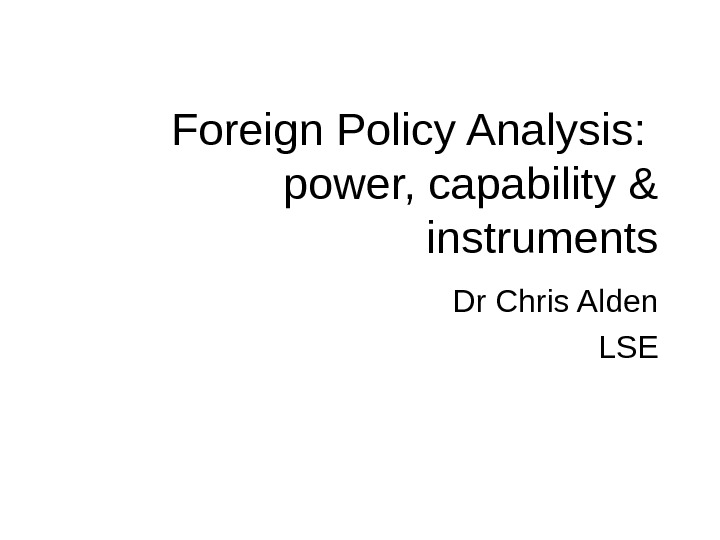
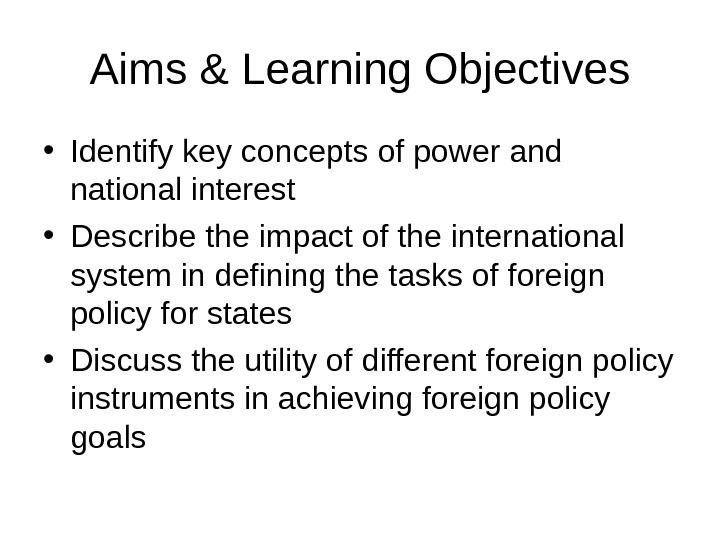
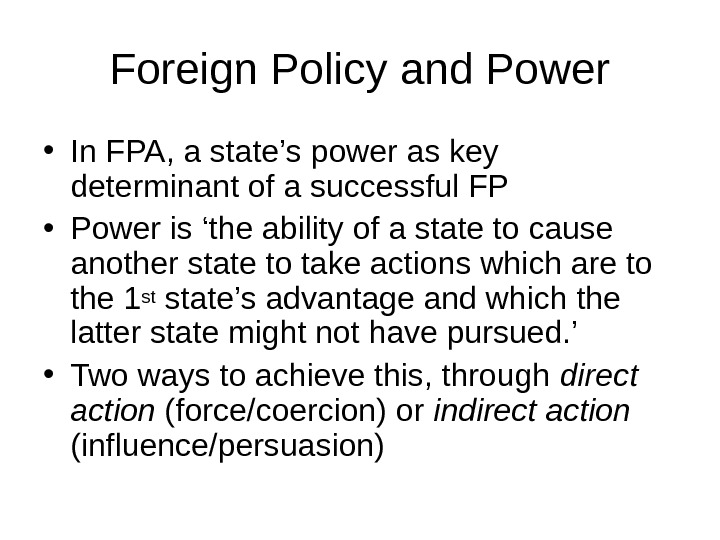
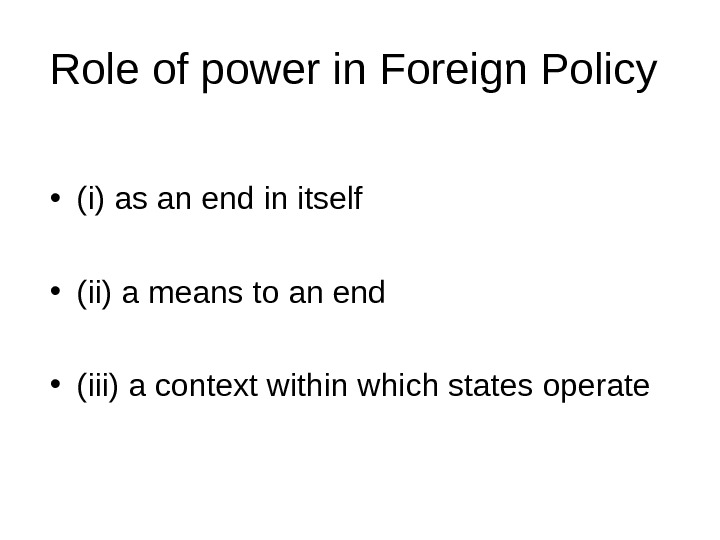
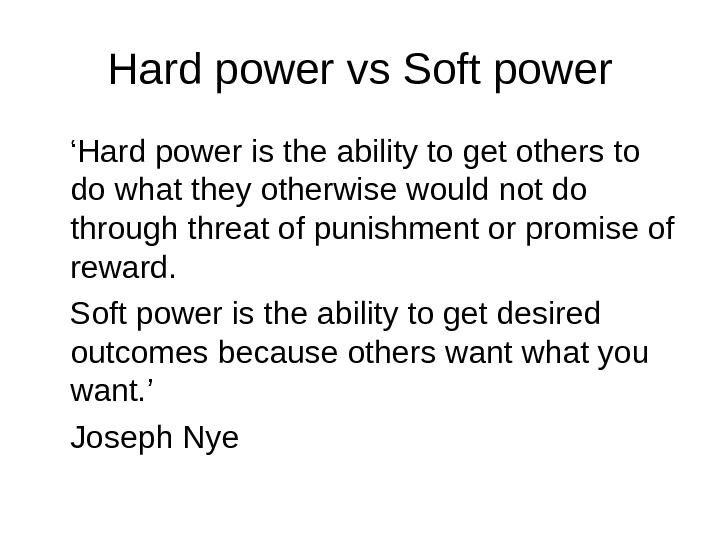
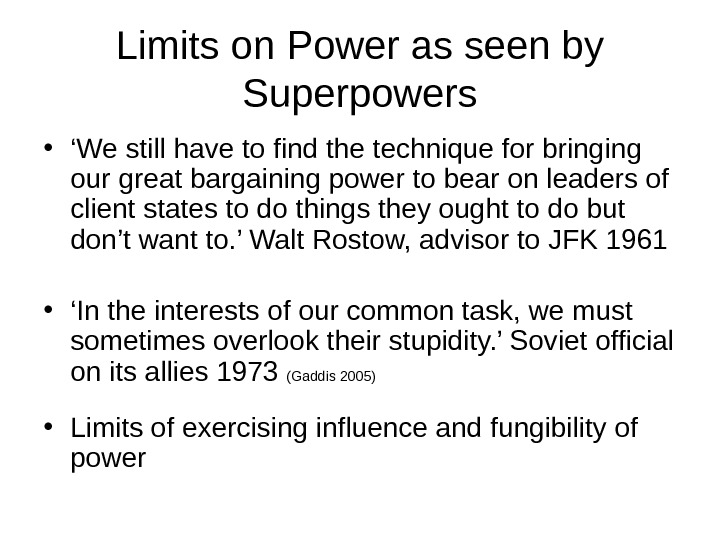
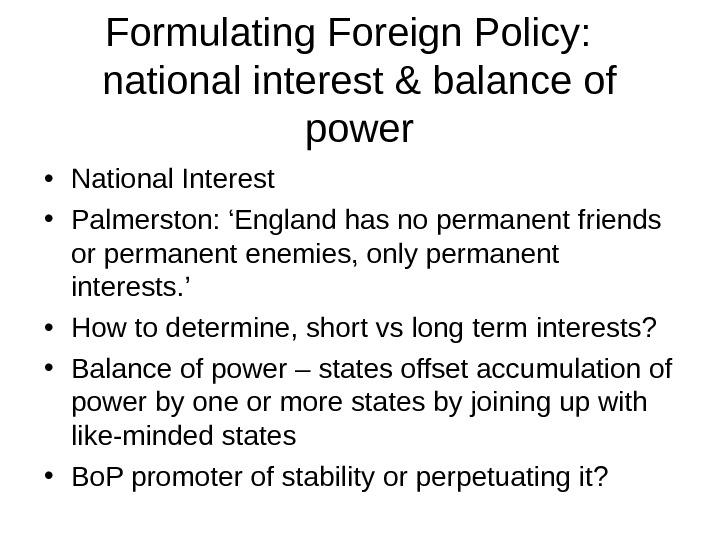
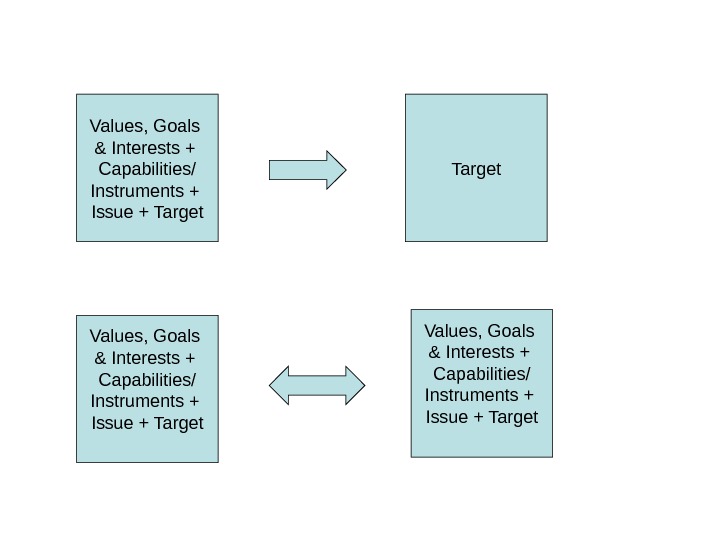

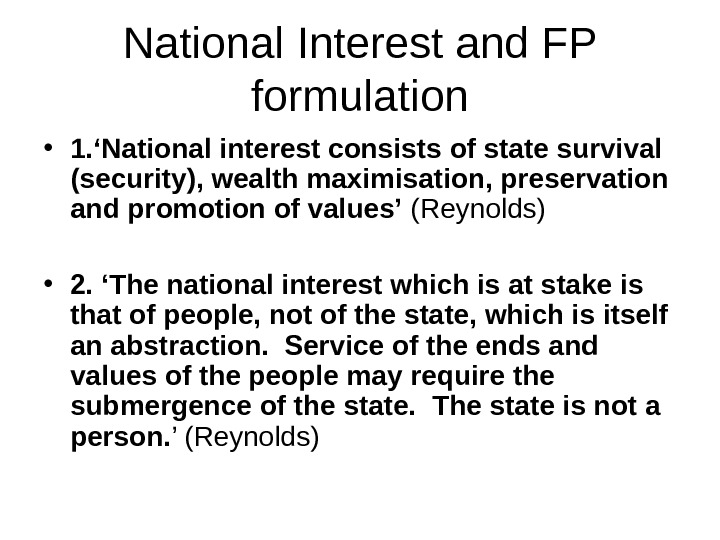

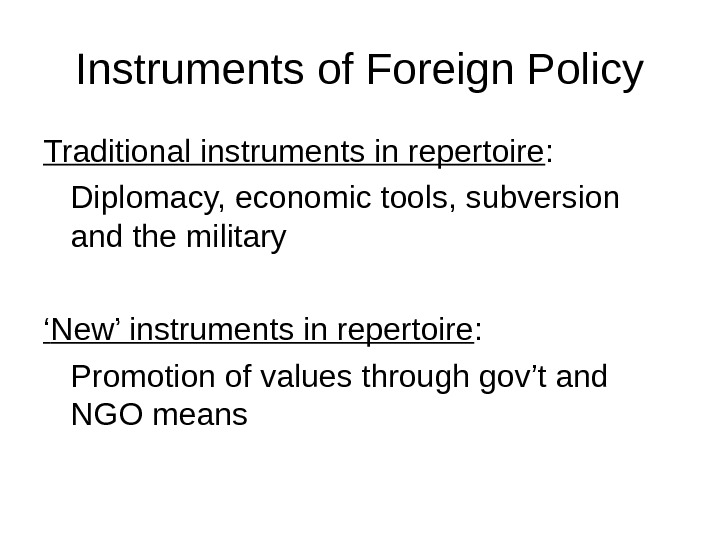
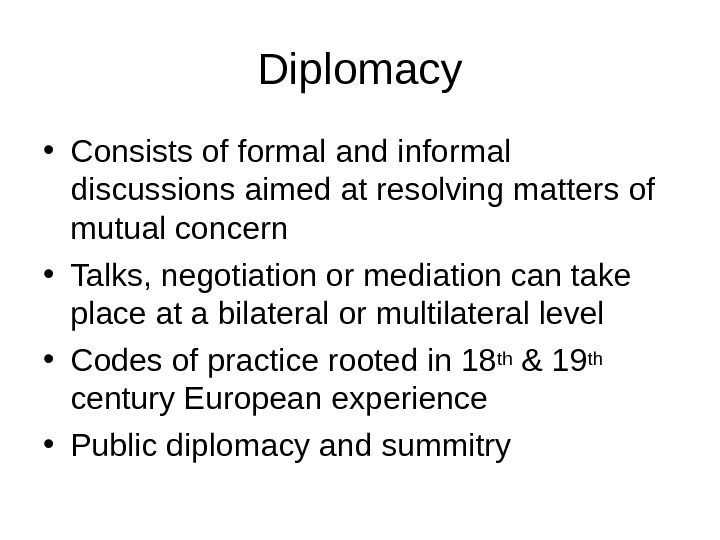
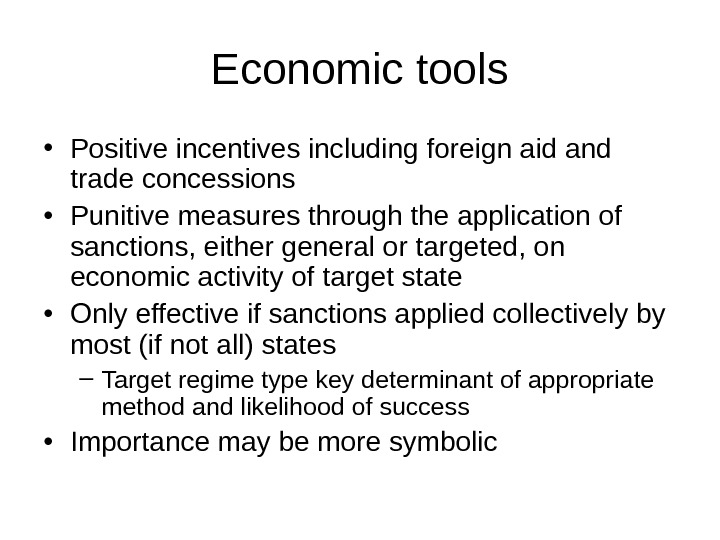
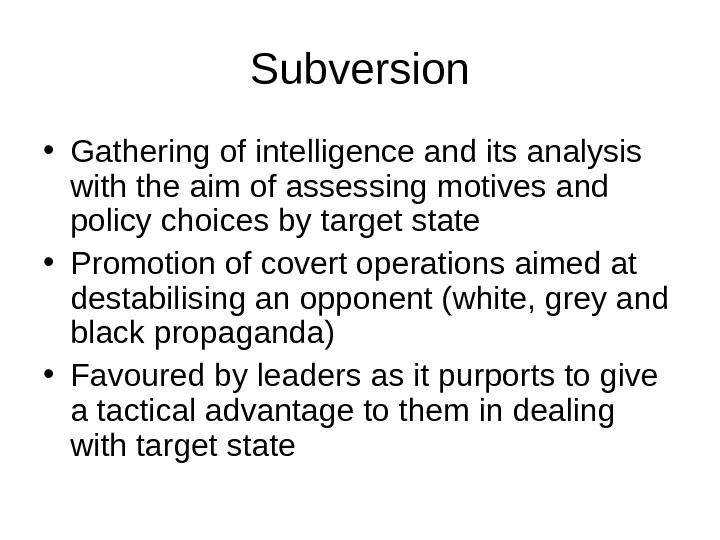
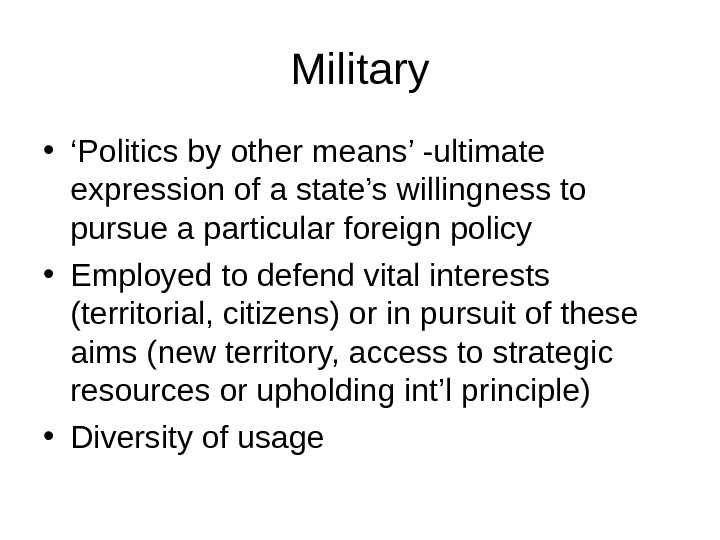

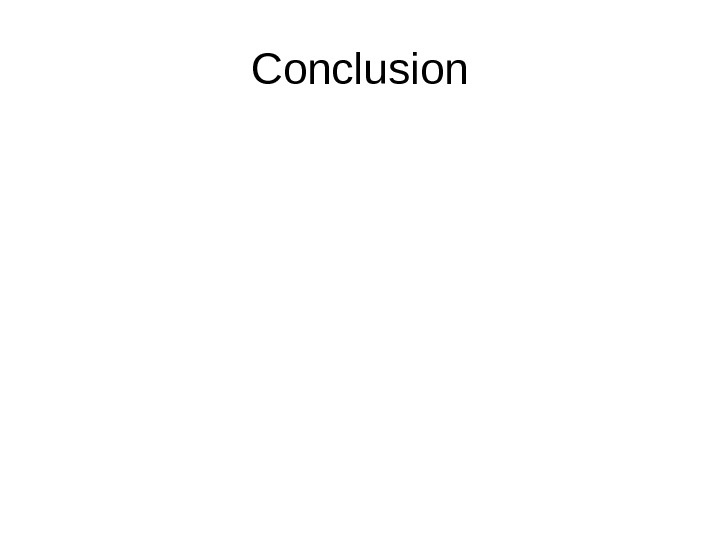
foreign_policy_analysis_2.ppt
- Размер: 46.5 Кб
- Количество слайдов: 18
Описание презентации Foreign Policy Analysis: power, capability & instruments по слайдам
 Foreign Policy Analysis: power, capability & instruments Dr Chris Alden LS
Foreign Policy Analysis: power, capability & instruments Dr Chris Alden LS
 Aims & Learning Objectives • Identify key concepts of power and national interest • Describe the impact of the international system in defining the tasks of foreign policy for states • Discuss the utility of different foreign policy instruments in achieving foreign policy goals
Aims & Learning Objectives • Identify key concepts of power and national interest • Describe the impact of the international system in defining the tasks of foreign policy for states • Discuss the utility of different foreign policy instruments in achieving foreign policy goals
 Foreign Policy and Power • In FPA, a state’s power as key determinant of a successful FP • Power is ‘the ability of a state to cause another state to take actions which are to the 1 st state’s advantage and which the latter state might not have pursued. ’ • Two ways to achieve this, through direct action (force/coercion) or indirect action (influence/persuasion)
Foreign Policy and Power • In FPA, a state’s power as key determinant of a successful FP • Power is ‘the ability of a state to cause another state to take actions which are to the 1 st state’s advantage and which the latter state might not have pursued. ’ • Two ways to achieve this, through direct action (force/coercion) or indirect action (influence/persuasion)
 Role of power in Foreign Policy • (i) as an end in itself • (ii) a means to an end • (iii) a context within which states operate
Role of power in Foreign Policy • (i) as an end in itself • (ii) a means to an end • (iii) a context within which states operate
 Hard power vs Soft power ‘ Hard power is the ability to get others to do what they otherwise would not do through threat of punishment or promise of reward. Soft power is the ability to get desired outcomes because others want what you want. ’ Joseph Nye
Hard power vs Soft power ‘ Hard power is the ability to get others to do what they otherwise would not do through threat of punishment or promise of reward. Soft power is the ability to get desired outcomes because others want what you want. ’ Joseph Nye
 Limits on Power as seen by Superpowers • ‘ We still have to find the technique for bringing our great bargaining power to bear on leaders of client states to do things they ought to do but don’t want to. ’ Walt Rostow, advisor to JFK 1961 • ‘ In the interests of our common task, we must sometimes overlook their stupidity. ’ Soviet official on its allies 1973 (Gaddis 2005) • Limits of exercising influence and fungibility of power
Limits on Power as seen by Superpowers • ‘ We still have to find the technique for bringing our great bargaining power to bear on leaders of client states to do things they ought to do but don’t want to. ’ Walt Rostow, advisor to JFK 1961 • ‘ In the interests of our common task, we must sometimes overlook their stupidity. ’ Soviet official on its allies 1973 (Gaddis 2005) • Limits of exercising influence and fungibility of power
 Formulating Foreign Policy: national interest & balance of power • National Interest • Palmerston: ‘England has no permanent friends or permanent enemies, only permanent interests. ’ • How to determine, short vs long term interests? • Balance of power – states offset accumulation of power by one or more states by joining up with like-minded states • Bo. P promoter of stability or perpetuating it?
Formulating Foreign Policy: national interest & balance of power • National Interest • Palmerston: ‘England has no permanent friends or permanent enemies, only permanent interests. ’ • How to determine, short vs long term interests? • Balance of power – states offset accumulation of power by one or more states by joining up with like-minded states • Bo. P promoter of stability or perpetuating it?
 Values, Goals & Interests + Capabilities/ Instruments + Issue + Target
Values, Goals & Interests + Capabilities/ Instruments + Issue + Target
 Formulating Foreign Policy: national interest & balance of power • For realists, anarchic nature of int’l system determines FP preferences & choices • For critics, NI not self-evident either from system or society sources but an elevation of the concerns of a segment of society to that of a national priority
Formulating Foreign Policy: national interest & balance of power • For realists, anarchic nature of int’l system determines FP preferences & choices • For critics, NI not self-evident either from system or society sources but an elevation of the concerns of a segment of society to that of a national priority
 National Interest and FP formulation • 1. ‘National interest consists of state survival (security), wealth maximisation, preservation and promotion of values’ (Reynolds) • 2. ‘The national interest which is at stake is that of people, not of the state, which is itself an abstraction. Service of the ends and values of the people may require the submergence of the state. The state is not a person. ’ (Reynolds)
National Interest and FP formulation • 1. ‘National interest consists of state survival (security), wealth maximisation, preservation and promotion of values’ (Reynolds) • 2. ‘The national interest which is at stake is that of people, not of the state, which is itself an abstraction. Service of the ends and values of the people may require the submergence of the state. The state is not a person. ’ (Reynolds)
 Formulating Foreign Policy Values • Milieu goals: aimed at changing the int’l system • Possessional goals: derived from actor/state’s particular needs Temporal Factors (short, long, core) Means/Instruments Target
Formulating Foreign Policy Values • Milieu goals: aimed at changing the int’l system • Possessional goals: derived from actor/state’s particular needs Temporal Factors (short, long, core) Means/Instruments Target
 Instruments of Foreign Policy Traditional instruments in repertoire : Diplomacy, economic tools, subversion and the military ‘ New’ instruments in repertoire : Promotion of values through gov’t and NGO means
Instruments of Foreign Policy Traditional instruments in repertoire : Diplomacy, economic tools, subversion and the military ‘ New’ instruments in repertoire : Promotion of values through gov’t and NGO means
 Diplomacy • Consists of formal and informal discussions aimed at resolving matters of mutual concern • Talks, negotiation or mediation can take place at a bilateral or multilateral level • Codes of practice rooted in 18 th & 19 th century European experience • Public diplomacy and summitry
Diplomacy • Consists of formal and informal discussions aimed at resolving matters of mutual concern • Talks, negotiation or mediation can take place at a bilateral or multilateral level • Codes of practice rooted in 18 th & 19 th century European experience • Public diplomacy and summitry
 Economic tools • Positive incentives including foreign aid and trade concessions • Punitive measures through the application of sanctions, either general or targeted, on economic activity of target state • Only effective if sanctions applied collectively by most (if not all) states – Target regime type key determinant of appropriate method and likelihood of success • Importance may be more symbolic
Economic tools • Positive incentives including foreign aid and trade concessions • Punitive measures through the application of sanctions, either general or targeted, on economic activity of target state • Only effective if sanctions applied collectively by most (if not all) states – Target regime type key determinant of appropriate method and likelihood of success • Importance may be more symbolic
 Subversion • Gathering of intelligence and its analysis with the aim of assessing motives and policy choices by target state • Promotion of covert operations aimed at destabilising an opponent (white, grey and black propaganda) • Favoured by leaders as it purports to give a tactical advantage to them in dealing with target state
Subversion • Gathering of intelligence and its analysis with the aim of assessing motives and policy choices by target state • Promotion of covert operations aimed at destabilising an opponent (white, grey and black propaganda) • Favoured by leaders as it purports to give a tactical advantage to them in dealing with target state
 Military • ‘ Politics by other means’ -ultimate expression of a state’s willingness to pursue a particular foreign policy • Employed to defend vital interests (territorial, citizens) or in pursuit of these aims (new territory, access to strategic resources or upholding int’l principle) • Diversity of usage
Military • ‘ Politics by other means’ -ultimate expression of a state’s willingness to pursue a particular foreign policy • Employed to defend vital interests (territorial, citizens) or in pursuit of these aims (new territory, access to strategic resources or upholding int’l principle) • Diversity of usage
 Values promotion • Explicitly ‘soft power’ approach whereby domestic actors in target state embrace values of promoter state & becomes basis for FP choice which conforms to promoter’s interests • Gov’t agencies promote societal values through educational exchanges/scholarships to elites aimed at shaping aims & choices • States fund NGOs (human rights, trade union, electoral) as do private foundations
Values promotion • Explicitly ‘soft power’ approach whereby domestic actors in target state embrace values of promoter state & becomes basis for FP choice which conforms to promoter’s interests • Gov’t agencies promote societal values through educational exchanges/scholarships to elites aimed at shaping aims & choices • States fund NGOs (human rights, trade union, electoral) as do private foundations
 Conclusion
Conclusion

